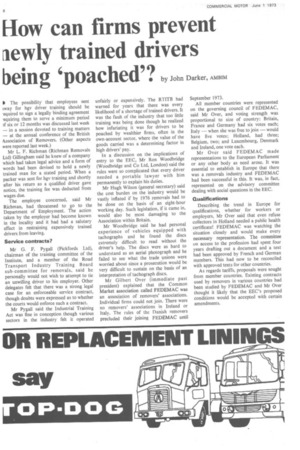How can firms prevent lewly trained drivers
Page 18

If you've noticed an error in this article please click here to report it so we can fix it.
being 'poached'? by John Darker, Amsim 11 The possibility that employees sent tway for hgv driver training should be .equired to sign a legally binding agreement .equiring them to serve a minimum period )f six or 12 months was discussed last week
— in a session devoted to training matters — at the annual conference of the British association of Removers. (Other aspects were reported last week.) Mr L. F. Richman (Richman Removals Ltd) Gillingham said he knew of a company which had taken legal advice and a form of words had been devised to hold a newly trained man for a stated period. When a packer was sent for hgv training and shortly after his return as a qualified driver gave notice, the training fee was deducted from wages due.
The employee concerned, said Mr Richman, had threatened to go to the Department of Employment. The action taken by the employer had become known in the locality and it had had a salutary effect in restraining expensively trained drivers from leaving.
Service contracts?
Mr G. F. Pygall (Pickfords Ltd), chairman of the training committee of the Institute, and a member of the Road Transport Industry Training Board sub-committee for removals, said he personally would not wish to attempt to tie an unwilling driver to his employer. Other delegates felt that there was a strong legal case for an enforceable service contract, though doubts were expressed as to whether the courts would enforce such a contract.
Mr Pygall said the Industrial Training Act was fine in conception though various sectors in the industry felt it operated unfairly or expensively. The RTITB had warned for years that there was every likelihood of a shortage of trained drivers. It was the fault of the industry that too little training was being done though he realized how infuriating it was for drivers to be poached by wealthier firms, often in the own-account sector, where the value of the goods carried was a determining factor in high drivers' pay.
In a discussion on the implications of entry to the EEC, Mr Ron Woodbridge (Woodbridge and Co Ltd, London) said the rules were so complicated that every driver needed a portable lawyer with him permanently to explain his duties.
Mr Hugh Wilson (general secretary) said the cost burden on the industry would be vastly inflated if by 1976 removals had to be done on the basis of an eight-hour working day. Such legislation, if it came in, would also be most damaging to the Association within Britain.
Mr Woodbridge said he had personal experience of vehicles equipped with tachographs and he found the discs extremely difficult to read without the driver's help. The discs were as hard to understand as an aerial photograph and he failed to see what the trade unions were worried about since a prosecution would be very difficult to sustain on the basis of an interpretation of tachograph discs.
Mr Gilbert Over (immediate past president) explained that the Common Market association called FEDEMAC was an association of removers' associations. Individual firms could not join. There were no removers' associations in Ireland or Italy. The rules of the Danish removers precluded their joining FEDEMAC until September 1973.
All member countries were represented on the governing council of FEDEMAC, said Mr Over, and voting strength was proportional to size of country: Britain, France and Germany had six votes each; Italy — when she was free to join — would have five votes; Holland, had three; Belgium, two; and Luxembourg, Denmark and Ireland, one vote each.
Mr Over said FEDEMAC made representations to the European Parliament or any other body as need arose. It was essential to establish in Europe that there was a removals industry and FEDEMAC had been successful in this. It was, in fact, represented on the advisory committee dealing with social questions in the EEC.
Qualifications Describing the trend in Europe for qualifications, whether for workers or employers, Mr Over said that even refuse collectors in Holland needed a public health certificate! FEDEMAC was watching the situation closely and would make every necessary representation. The committee on access to the profession had spent four years drafting out a document and a text had been approved by French and German members. This had now to be reconciled with approved texts for other countries.
As regards tariffs, proposals were sought from member countries. Existing contracts used by removers in various countries had been studied by FEDEMAC and Mr Over thought it likely that the EEC's proposed conditions would be accepted with certain amendments.




































































































